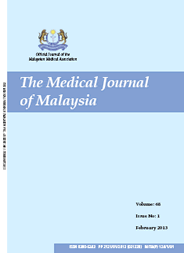MJM, Vol 70 Supplement 1 September 2015
Ebola Virus Disease (EVD): Investment during
peaceful time is the wise solution
Johor State Health Department
ABSTRACT
Ebola, an old disease discovered in 1976, appeared in a new context that favoured rapid and initially undetected spread resulting in current largest and most complex outbreak in West Africa. Previous EVD outbreaks occurred in remote villages, but this outbreak has involved major urban as well as rural areas with a dense and highly mobile population. The lack of knowledge, experience and capacity hindered early detection of the event and timely initiation of an effective outbreak response. Other trigger factors were weaken health care system in all the three most affected countries (Guinea, Liberia and Sierra Leone) and cultural practices and beliefs, like burial rites, constituted a high-risk for EVD transmission. Getting to zero cases in Ebola affected countries is only possible through rigorous surveillance and thorough case finding, case investigation and management, and extensive contact tracing. Risk communication need to be strengthened and reach all level of communities. In ensuring a better preparedness among the countries facing imported cases of EVD, like in Malaysia, investment in core capacities and health security system strengthening during peaceful time is very essential. This outbreak has revealed that the world needs to be better prepared for a large and sustained disease outbreak and we should remember that infectious diseases are unpredictable and so we must prepare for the unexpected.
